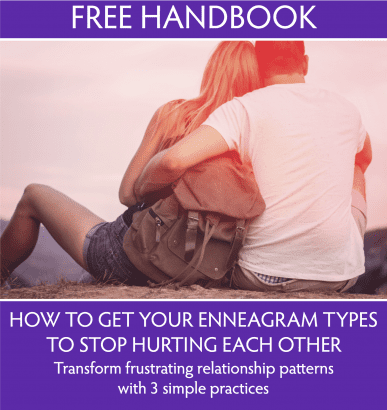When things are difficult in our lives, we can be run even more tightly by our enneagram type patterns. Challenging times can also bring out the less enjoyable traits of our types.
Of course difficulty can bring out the best in us as well, but this is more likely when we have some awareness of how to turn toward it, rather than defend ourselves from it.
So how do we avoid getting played by our types in this way? How do we do something differently so that our default patterns don’t make things harder for us?
You can imagine that we’re all walking around with special filters on that let in primarily one wavelength of light. The world looks convincingly yellowish or greenish or pinkish, depending on our particular focus on the spectrum. 
Our enneatype filters make us each a specialist— for example, type Five’s specialty encourages one to see things in a rational, objective way. This can be extremely useful in certain situations, and less apt in others.
When I unwittingly apply my specialty to most everything I encounter, I am overusing it. My filter ends up blocking me from the more complete truth of what’s here in the moment.
My type insists on its interpretation without my permission. It tells me “the world must remain purplish!”
Realizing that We Are Blocked
The more I work with my patterns, the more I see that they are not the truth of me. They are sort of like the terrain I travel, or the weather patterns around me. They affect me, they influence my perception, and they give me a particular way to experience myself.
At type Two, for example, my world view is that others need my care and support. As a Two, this seems like a deep truth that pervades life in almost every situation. While it will be true in certain moments that others need care and support, and that sometimes it will be my privilege to offer it, in other moments, it may not be needed at all— or not from me. In fact, sometimes it can feel invasive, patronizing or disempowering to others.
How do we know which moment is which- when our type’s autopilot is well suited to the actual situation that we’re in? This is the work of awareness practice and presence.
- When I become aware of my patterns, I can catch them and question whether to follow their dictates.
- Once I’m aware, I can choose to become present in the moment where my body, heart and mind can help me tune into exactly what’s needed.

I may have glimmers of the truth of who I am and what this life is, but it’s obviously hard to remember that which I don’t yet consciously know or believe. This is part of the mystery and adventure of opening up new territory.
Awareness of our enneatypes supports “cracking the code” of what’s real. It’s like discovering our own Matrix that we inhabit and continue to broadcast as reality.
9 Ways We Get Blocked from the Truth
Below are some deep assumptions that each type overlays onto ordinary situations in life. The more earnestly we believe them, the harder it is to open to something new.
Things we implicitly tell ourselves that block us from the Truth:
Type 1 I see things correctly. The other is [or I am] screwing things up.
Type 2 I am indispensable. I’m OK when I’m pleasing the other.
Type 3 It’s up to me to make it happen. I’m OK when I’m getting results.
Type 4 There’s something wrong with me. I’m OK when I’m seen as special.
Type 5 I don’t have enough resources/information. I need to hold onto what I have.
Type 6 It’s not safe. I can’t trust. There’s no support.
Type 7 I’ve got to stay nimble to not get stuck. Got to keep things “up.”
Type 8 I’ve got to be strong and protective against this harsh world.
Type 9 I’m not important. I can’t make others uncomfortable.
We usually don’t say these things directly to ourselves. We may or may not be aware that they are filtering and determining our experience.
At type One, for example, the effect of believing that “Others are (or I am) screwing things up,” could show up as my body becoming tight, my heart resentful, and my mind judging. While this state may be familiar and feel justified to me, I don’t enjoy it, and neither do others.
As we become more familiar with the effect of these beliefs in our bodies, hearts and minds, awareness of the block itself can be a wake-up call. Seeing it in action can prompt us to remember that there is a larger truth that we can tap into.
For example, at type Six I may start to notice that when I don’t feel safe or trusting, my thinking gets extra vigilant, my body feels like there’s no support beneath me, and my heart feels tight and guarded. Rather than interpreting these as evidence that I am objectively threatened, I can start to see them as a phenomenon- a frequent weather pattern in the biome of my type.
Observation and Choice
From a position of simple observation, I don’t have to believe my thinking, feeling and sensing in the same way. Instead:
- I might wonder which interpretations may have invited this familiar stance to arise.
- I might simply open to other possible ways of regarding the situation and see what arises.
- I might be able to listen to what deeper needs or fears are asking for my attention.
Any of these can change the game because all of a sudden I have choice about where and how to direct my attention, rather than being subject to my automatic pattern.
What I used to take to be the truth I can now work with as a limited or specialized lens that automatically presents a particular perception of what’s happening.
Opening to the Truth
So, when I’ve developed some capacity to notice that my trusty lens is focusing my experience in a habitual way, it helps to find a way to invite myself into a broader arena or inner conversation.
One way to do this is to wonder how else I could possibly perceive the situation. I offer some potential questions to ask yourself when you know you’d like to see things freshly.
Questions to Invite us to Open
Type 1 What if the way things are happening is just right for the next layer to emerge?
What if different approaches can each truly be valid?
Type 2 Can I let the other’s needs belong to him/her?
Can I include what would please me?
Type 3 How does the universe seem to want to express through me right now?
What if I let myself be a human being?
Type 4 May I appreciate an aspect of my amazing ordinariness?
What if my soul actually can’t be disconnected from the great mystery?
Type 5 What if I could notice the plenty that is here?
Can I sense the freedom, the space, the connections and the invitations to engage?
Type 6 Can I sense the true support in my body and in the world?
What helps me be brave even when I’m not sure?
Type 7 What if I could open to the richness and nourishment of the present moment?
There are so many more possibilities than “up.”
Type 8 What if I could abide in my natural innocence?
What would it be like to view the world from here?
Type 9 What if I knew that my presence matters?
What if I am not responsible for others’ discomfort?
Intention and Tone Matter
The way we might ask ourselves these types of questions of course works best when we are sincerely interested in finding options that go beyond our type’s instruction manual.
For example, if I’m a Three who is invested in being even more effective at work, when I ask myself the question, “How does the universe seem to want to express through me right now?” My type-pattern might offer up an answer like, “The universe wants me to assert my vision to the team in a more compelling way.” Regardless of the work situation, this is not likely helping me see things in a more expanded or fresh way for type Three.
Asking questions like these also works best when we are present and receptive. When I’m not, my inner critic is likely to try to answer for me.
For example, as type Four, I might ask myself, “What if my soul actually can’t be disconnected from the great mystery?” If I’m not present and receptive when I ask it, I could easily hear a response from my judge like, “Well then there’s something really wrong with me, because I can’t feel the connection.”
When the critic sneaks in to this tender territory, it can feel like shrinking back into a small, old, familiar form, adding another nugget of confirmation to stick with the old pattern.
Becoming Your Own Director
 So, yes, when we’re challenged and stressed, it can be harder to see past our patterns. Our critic and our defenses will rise to the occasion to try to keep the old order operating at full strength.
So, yes, when we’re challenged and stressed, it can be harder to see past our patterns. Our critic and our defenses will rise to the occasion to try to keep the old order operating at full strength.
And as we more consistently put our finger on the familiar suite of thoughts, emotions and sensations that accompany our type’s point of view, we increase the likelihood that we can press the “pause button” on this re-run’s familiar plot.
This awareness supports our ability to become the director of our show. The character development can then become both rich and subtle, the plot intriguing and deep.
Please share below how you experience your blocks to truth, and whether you’ve found ways to open to what’s beyond them.








5 Responses
A wonderful post! and you hit the nail on the head for my type, I am a big fan of the Enneagram!! Personally i have found tools to explore my world, Mbraining (latest neuroscience)which highlights we have 3 centers of intelligence, no surprises for us Enneagram folk! and we can align all 3 centers for our highest wisdom. I also use TRE which is a self regulation tool to unpack your emotional history from your body without the need for you “story”. As a type 9 this was a revelation to me, it has and does bring me back into my body. Last but not least EFT. We are all on our own journey, we are all in our own way and we can all be response-able for our awareness of that gap
Thanks for sharing, Sue. I’m glad to hear my offerings resonate with your own experience. It sounds like you’ve found some solid tools to work with to work your themes. I also have found that working with deep patterns, the body, and separating from “story” are essential to opening up to an expanded version of ourselves. Instead of pushing away the story/patterns, their presence can invite us into the work our soul wants us to do so that we can access that higher wisdom! Hooray!
I appreciated the article. I like how you sumarized how the Enneagram can begin to free us from our automatic responses which often get in the way of us fully living our lives. I keep reminding myself and my clients that our life tool box is much bigger than we think.
Thanks Roland. What’s interesting to me is how the Enneagram can strike people as constraining at first, but when we can observe and acknowledge our everyday constraints, the map can help us feel into what’s possible beyond the ordinary. I think this is the real treasure the Enneagram offers us.
Love The Matrix! Neo and Trinity. Zion. A new identity. I’m particularly inspired by Two’s letting others’ feelings be with them. Learning the bliss of savoring every moment as it is, aware of movement, free of the need to evaluate, judge, control. It is liberating. Thank-you Sarah.